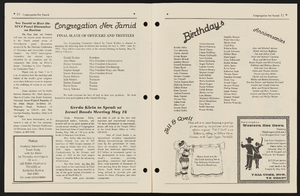Search the Special Collections and Archives Portal
Search Results
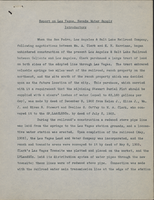
Report on the water supply in Las Vegas, March 25, 1942
Date
Archival Collection
Description
Brief history of water in Las Vegas and overview of the water situation
Text
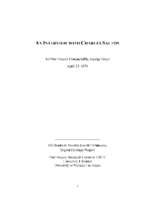
Transcript of interview with Charles Salton by George Green, April 23, 1976
Date
Archival Collection
Description
Interview with Charles Salton by George Green on April 23, 1976. Salton discusses arriving in Las Vegas in 1929, after his family had moved from New Jersey to Huntington Beach, California. His father sold real estate, and expected a boom after the authorization for the construction of Hoover Dam. His father was involved in bootlegging and then owned Al's Bar, a drinking and gambling establishment, on the alley at South First Street. Salton describes the area around Fremont Street and Las Vegas Boulevard with businesses and grocery stores, the grammar school and high school, and the hospital. Salton talks about his social activities, including involvement in the Jewish Community Center (Temple Beth Sholom), and several of the bars, clubs and casinos in the area. He briefly discusses the mob influence in the casinos versus corporate ownership and then speaks about the education system in Clark County.
Text

Transcript of interview with George Gilbert by Ruth Guidi, February 10, 1975
Date
Archival Collection
Description
On February 10, 1975, Ruth Guidi interviewed George Gilbert (born 1931 in Southgate, California) about his life in Nevada. George first talks about his education in Las Vegas and his family background. He also talks about times during World War II, the shopping facilities available to those in Las Vegas, the casinos that existed, the churches that were built, and the Helldorado parades. The two also discuss social clubs, politics, the atomic testing, environmental and social changes, the Mormon Fort, Hoover Dam, and the first movie theaters.
Text

Transcript of interview with Horace Emery by Barry Sarles, March 2, 1980
Date
Description
On March 2, 1980, Barry Sarles interviewed river boatman and dam worker, Horace Emery (born 1911 in California) at his older brother’s farm in Nelson, Nevada. This interview covers the local area around Nelson and the early events that helped shape the area. Also present during the interview, Barry Sarles’s girlfriend, Diane Dobaj and Horace’s older brother, Merl Emery. Mr. Sarles also discusses his work as a river boatman on the Colorado River, working on the Hoover and Davis Dams, and employment as a factory worker in Clark County.
Text

Transcript of interview with Harvey N. Dondero by Iskander A. Batlouni, February 26, 1981
Date
Archival Collection
Description
Text
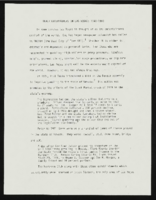
"Black Entertainers in Las Vegas in the Era of Segregation 1940-1960": manuscript draft by Roosevelt Fitzgerald
Date
Archival Collection
Description
From the Roosevelt Fitzgerald Professional Papers (MS-01082) -- Unpublished manuscripts file.
Text

Don Perry interview, March 05, 1978: transcript
Date
Archival Collection
Description
On March 5th, 1978, Karen Croteau interviewed Don Perry (b. 1928 in Clarksburg, West Virginia) about Paiute Indians and life on a reservation. Perry begins by mentioning his own Indian heritage with a Cherokee mother and his wife’s Paiute heritage. Perry focuses on his conversations with his wife’s grandmother, who lived on the Paiute reservation since birth, from who he learned about the reservations history. He particularly delves into the traditions of Indian burials, governing on the reservation, and the difference between an Indian reservation and an Indian colony. Additionally, he talks about recreation on the reservations, education of Paiute Indians, and how reservations have changed. Throughout the interview, Perry gives personal anecdotes about his life in connection to the Paiute people and his experiences with their traditions and belief systems. Perry ends by discussing governing politics of the Paiute reservation and the start of Las Vegas as a gambling town.
Text
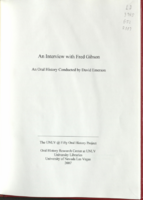
Transcript of interview with Fred Gibson by David Emerson, February 13, 2008
Date
Archival Collection
Description
Text

Dr. Linda K. Miller oral history interview: transcript
Date
Archival Collection
Description
Oral history interview with Dr. Linda K. Miller conducted by Claytee D. White on July 10, 2019 for Boyer Early Las Vegas Oral History Project. In this interview, Dr. Miller discusses her early life in Kansas City, Kansas and arriving to Las Vegas, Nevada in 2002. She talks about Helen J. Stewart, the Old Mormon Fort, and the significance of that area. Later, Dr. Miller explains the importance of teaching local history to people in Las Vegas. Lastly, Dr. Miller discusses the process of writing a book about Helen J. Stewart.
Text

